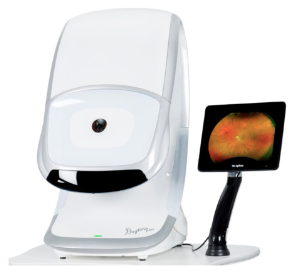At Look East, our doctors are passionate about ocular health and dedicated to providing only the highest quality of eye care. We examine every ocular structure thoroughly, from the eyelids back to the innermost layer of the eye, called the retina.
The retina is the light sensitive tissue in the back of the eye that sends images to the brain. Our doctors believe that thoroughly examining the retina is so important that they now take retinal photos of every patient at their annual exam (or more frequently if indicated). Many offices charge a fee for this service since it is not covered by insurance plans, but we offer this imaging free of charge to ensure each patient we see is receiving the highest quality of eye care!
Historically, dilation drops were the only way to obtain a full view of all of the retinal structures. These drops take about 30 minutes to work and temporarily paralyze the muscle that controls how the pupil responds to light. Once the pupils are dilated, doctors can use a special light and lens to view all of the retinal structures. Dilation lasts for about 4-6 hours, causes reduced near vision and light sensitivity and may occasionally also cause headaches and nausea.
Modern technology now allows us to take a quick photograph into the back of the eye to obtain a snapshot view of the retinal structures without the wait, without any side effects and with no drops! This is accomplished using our Optomap camera. Our doctors can show you your images immediately and these images are stored for annual comparison. (Please note, dilation drops may still be necessary in certain cases).
Full retinal imaging is a vital part of every eye exam because it allows our doctors to monitor for signs of glaucoma, macular degeneration, diabetic retinopathy, retinal thinning, and more. Retinal findings can even indicate potential underlying diseases such as high blood pressure, brain tumors and even cancer.
Routine retinal evaluation is particularly essential for patients over the age of 50. These patients are at a higher risk of developing certain ocular diseases than can result in permanent vision loss if left untreated. Many of these conditions have no symptoms until they reach more advanced stages, so regular monitoring is the only way our doctors can make sure you are receiving appropriate care!




